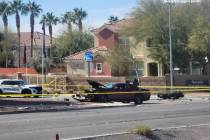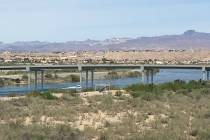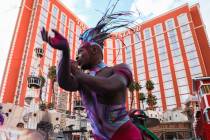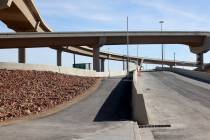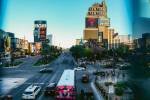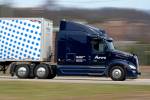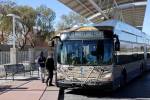Driverless cars will outrun high-speed rail
Forget DesertXpress. Forget a magnetic levitation train. Forget high-speed rail altogether.
It's too expensive and by the time a line is built between Las Vegas and Southern California, if that even happens, the technology will be outdated and unpopular.
At least, that's the position taken by Randal O'Toole, an urban land use expert with the Cato Institute, a public policy research foundation.
"America is on the verge of a new transportation revolution," O'Toole said last week . "That revolution is not going to be high-speed rail. It's not going to be light rail or street cars."
Nope. If O'Toole's prediction is correct, those of us who shudder and wince at the thought of leaving behind our convenient and comfortable vehicles can rest easy.
He firmly believes driverless vehicles will lead the way in transportation revolution.
Goofy science fiction, right? Admittedly, I rolled my eyes too. But O'Toole's presentation was intriguing.
Those of you technology enthusiasts know this is not a stretch. In fact, these vehicles have been tested all over the world. Engineers from Stanford University have developed the most advanced vehicles to date.
Undoubtedly, this new mode of transportation is expected to be in the news this fall when those engineers' driverless Audi TT negotiates the hairpin turns up Pikes Peak in Colorado at racing speeds.
According to O'Toole, this vehicle never veers more than a half-inch off course.
These vehicles are equipped with "lane keep assist systems," which are controlled by cameras that detect the lane stripes and keep the vehicle within those lines.
Obviously, the lane markers must be in better condition than those we see on Interstate 15, otherwise the detectors would go bonkers and we'd be pulled over for drunken driving.
They also have "adaptive cruise control," which uses lasers to detect fellow motorists on all sides of the car. If the vehicle traveling ahead of the driverless car is too slow, the high-tech car will move over, pass and then return to its original lane.
O'Toole envisions driverless vehicles mingling with traditional cars at first. The driverless vehicle would simply see other cars being objects they detect, but designated lanes similar to high-occupancy lanes could be created for the new cars.
The greatest obstacle at this point is, you guessed it, the government, which O'Toole said would rather push high-speed, taxpayer-subsidized trains on us.
It's political, he said.
Driverless vehicles could be the norm by 2018 barring any major hurdles, he said. "They would be institutional and bureaucratic, not technological. Turning vehicles into driverless cars is basically a software update," O'Toole said.
So how exactly would this new technology improve congestion on the stretch between Southern Nevada and Los Angeles or address pollution problems?
O'Toole believes if everyone rode in a driverless vehicle, our highways could accommodate 6,000 vehicles per lane per hour, three times the amount today. Great, so how does that help with pollution and congestion? They would all be moving at consistent speeds and traffic jams would be headaches of the past. Fewer cars idling equals less pollution.
Ultimately, speed limits might be raised because driverless vehicles are viewed by some as safer.
"Collisions are caused by slow reflexes; computers won't have that," O'Toole said.
Europeans are testing an advanced system in which a truck travels along the freeway and sends out a signal behind it. Driverless vehicles can link into the signal and the operator can kick back and nap or read until their desired exit approaches. Then they simply turn the signal off and take control themselves.
This all might sound far-fetched, but it appears the chances of us riding in but not driving our own cars are about as good as any of us riding in a Las Vegas-to-Anaheim high-speed train anytime soon.
If you have a question, tip or tirade, call Adrienne Packer at 702-387-2904, or send an e-mail to roadwarrior@reviewjournal
.com. Please include your phone number.
• Starting Monday and continuing through the next two months, traffic lane restrictions will be in effect intermittently on Village Center Circle, on Hills Center Drive between Village Center and Lake Mead Boulevard, and on Town Center Drive between Village Center and Summerlin Parkway. Traffic restrictions may be in effect weekdays and on weekends on a 24-hour basis. These disruptions are necessary as crews resurface the roads. There will be rough milled surfaces that could pose a danger to bicyclists.
• Beginning Tuesday and continuing through the next two months, traffic lane restrictions will be in effect on Durango Drive, between Cheyenne Avenue and Alexander Road, as part of a roadway maintenance and sidewalk improvement project. Temporary traffic lane restrictions will occur in work zones on weekdays and also may be in place during weekends.
• Beginning Wednesday, similar work is being done on Alexander Road, between Cimarron Road and U.S. Highway 95. This too will cause lane restrictions in work zones for the next two months. Alexander will reopen as work in each section is completed.
• Helldorado is causing all sorts of street closures downtown. Fourth Street between Charleston Boulevard and Stewart Avenue closes from 3 p.m. to 10 p.m. on Saturday. Closed until May 26 are Sixth Street between Stewart and Mesquite Avenue, Seventh Street between Stewart and Mesquite and Mesquite between Las Vegas Boulevard and Seventh.
• Alta Drive, between Rainbow Boulevard and Lorenzi Street, will be closed through May 22. The city of Las Vegas is working on an $8.7 million flood control improvement project. Traffic on Rainbow and Lorenzi is not expected to be affected, and motorists who typically take Alta are advised to use Charleston Boulevard instead.
• Executive Airport Drive from Volunteer Boulevard to Executive Terminal Drive will be closed for two months. Volunteer from the Anthem boundary west to Executive Airport Drive will be under construction but will remain open to motorists. Residents leaving Anthem will be detoured west on Volunteer past Executive Airport Drive to Las Vegas Boulevard. The closures are because of reconstruction of Volunteer and Executive Airport Drive.
LAS VEGAS REVIEW-JOURNAL










